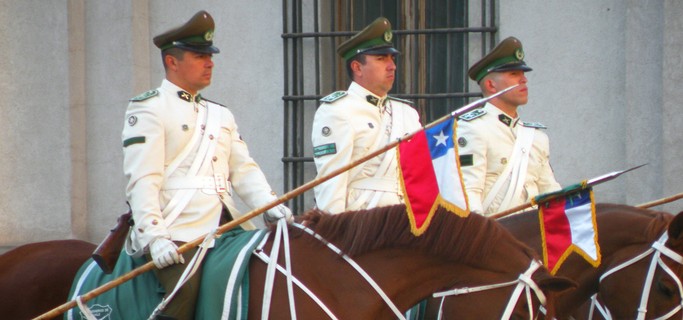Time Period: 1988
Location: Chile
Main Actors: Fernando Matthei (Air Force General), Rodolfo Stange (General Director of the Police), José Merino (Navy Admiral)
Tactics
– Withholding or withdrawal of allegiance
– Mutinies by government personnel
– Deliberate inefficiency and selective noncooperation by enforcement agents
In 1973, a group of military officers led by General Augusto Pinochet and supported by the United States government overthrew Chile’s democratically elected, socialist president, Salvador Allende. Pinochet’s authoritarian military junta dissolved Chile’s congress, purged the bureaucracy and judiciary of known and suspected socialists, and prosecuted its opponents in military tribunals. Critics of the regime, both elites and ordinary citizens, were arrested without warrant, indefinitely detained, tortured, and executed.
Chile’s 1980 constitution both empowered the military junta and provided for a transition to civilian, democratic rule in 1990. A plebiscite was held in 1988 to determine whether Pinochet would serve as civilian president for another eight years, i.e., from 1990-98. The actions of elite junta members during and after the plebiscite constitute remarkable instances of pro-democracy defection.
In the lead-up to the plebiscite, General Hugo Salas Wenzel, a Pinochet loyalist and director of the secret police, met with intelligence chiefs from the Navy, Air Force, and Police. Wenzel described a plan to invalidate the plebiscite if Pinochet were to lose. After hearing of this plan, Air Force General Fernando Matthei and others requested a meeting with Pinochet where they told him that he must respect the constitution, which Pinochet refused.
On the night of the plebiscite, Pinochet’s supporters requested permission to hold premature victory demonstrations, despite Chile’s authoritarian ban on public assemblies. The supporters likely sought to incite counter-demonstrations, which Pinochet could use as a pretext to justify cracking down on his opponents and invalidating the plebiscite. Police Director Rodolfo Stange refused this request. That evening, Stange’s units arrested agitators from secret police attempting to stir up trouble and refused to promptly release them.
As Pinochet’s plebiscite loss became clearer to junta leaders, the latter took actions to contradict the disinformation being peddled on state media. General Matthei openly told a group of news reporters that it looked like Pinochet had lost. Later that night, Pinochet met with members of the junta and refused to leave office, threatening to fill the streets with troops and remove any generals who opposed him. The generals told Pinochet that he lacked the power to do any of this. Pinochet then asked the junta leaders to sign a document allegedly containing the meeting minutes; in fact, the document asked for an extension of his authoritarian emergency powers. General Matthei tore up the document and other junta members refused to sign it. Pinochet ultimately left office after his term expired, although he played an important role in Chile’s military and political system thereafter.
These acts of defiance by military elites allied to Pinochet were critical in prompting Chile’s transition to democracy. In addition, their actions were personally risky, as they faced potential prosecution for human rights abuses after Pinochet’s departure. However, Amnesty laws decreed by Pinochet have served to indefinitely protect most junta leaders.
What explains these risky and consequential defections? A first set of factors were domestic: although the military was united in its aversion to socialism, it was more divided with respect to Pinochet’s free market policy agenda as well as the prospect of decades-long military rule. Indeed, Pinochet’s tenure had already reached 16 years and was being proposed to extend to 25. There was a broad sentiment within the military of “mission accomplished”: the purported threats posed by Allende’s socialist government were seen to have been averted by 15 years of military rule. Another set of factors were international: by 1988, the US had deemed Pinochet a liability whose aggressive right wing dictatorship could threaten to incite a leftist revolution. Junta leaders sought continued US support, which was less likely if they refused to distance themselves from Pinochet.
US democracy organizers may wonder whether lessons can be drawn from the example of a military autocracy like Chile. In spite of its many differences from the US, Chile’s experience highlights the importance of differences of opinion among elites, even those who have supported the authoritarian status quo. In Chile, these differences of opinion –particularly whether Pinochet was a reliable ally– proved highly consequential for the transition to democratic rule. Pillar leaders, whether supportive or skeptical of democracy, have personal interests they wish to protect that may not always align with the dictator’s interests. As Pinochet’s violence and electoral fraud became increasingly unsustainable, a crucial segment of his allies deemed democracy more consistent with their goals.
A second lesson relates to the importance of non-elites and their interactions with military elites. In addition to the military defections described above was a sustained, nonviolent struggle conducted by workers, university students, and religious groups, among others. Through peaceful protests and labor strikes, the Chilean masses demonstrated to junta leaders that a post-Pinochet world would not be unstable and chaotic. This points to the importance of democratic mass action as contributing to elite loyalty shifts.
Where to Learn More
– Kornbluh, P. (2023). The American Ambassador Who Helped Stop a Coup in Chile. The Nation.
– Kurtz, L. (2009). Chile: Struggle against a military dictator (1985-1988). International Center on Nonviolent Conflict.
– Merloe, P. (2023). Standing with Democracy over Military Dictatorship: Chile’s 1988 Presidential Plebiscite. National Democratic Institute.
– Spooner, M. H. (2011). The General’s Slow Retreat: Chile After Pinochet. University of California Press.
You can access all the caselets from the Pillars of Support Project here.

